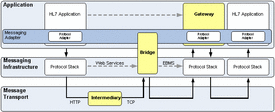This wiki has undergone a migration to Confluence found Here
Gateway
Revision as of 06:42, 21 March 2006 by Rene spronk (talk | contribs)
A Gateway is an HL7-artefacts aware application which executes business rules, and forwards/ copies/ amends/ transforms interactions (messages or batched messages) based on those business rules. In order to perform those business rules, a Gateway is always an HL7 application that is listed as the receiver of the incoming interactions and sender of the outgoing interactions (just like any other HL7 Application).
- Question (Phoenix Action Item, refering to ATS Line item 52) - Are the Gateways always trusted? Is there a use case or a possibility of a highly distributed environment where Gateways are *not* trusted?
- (Miroslav) I feel that this should be out of the scope of the ATS discussion, since this very much depends on the business scenarios. For the sake of the argument, I see Gateways the same way like any other HL7 applications, which should but don't have to be trusted. This depends on business level contracts, netowrk and application configuration, security provisioning etc. If we need to put something in the doc, I'd suggest that we say that "the Gateways, like any other sending HL7 applications should always be trusted, however this depends on many different network/application configuration parameters. What implementors need to be aware of is that if a Gateway is not trusted, Receivers will probably drop all further communication with the Gateway from their side.
Back to the Open ATS Issues
